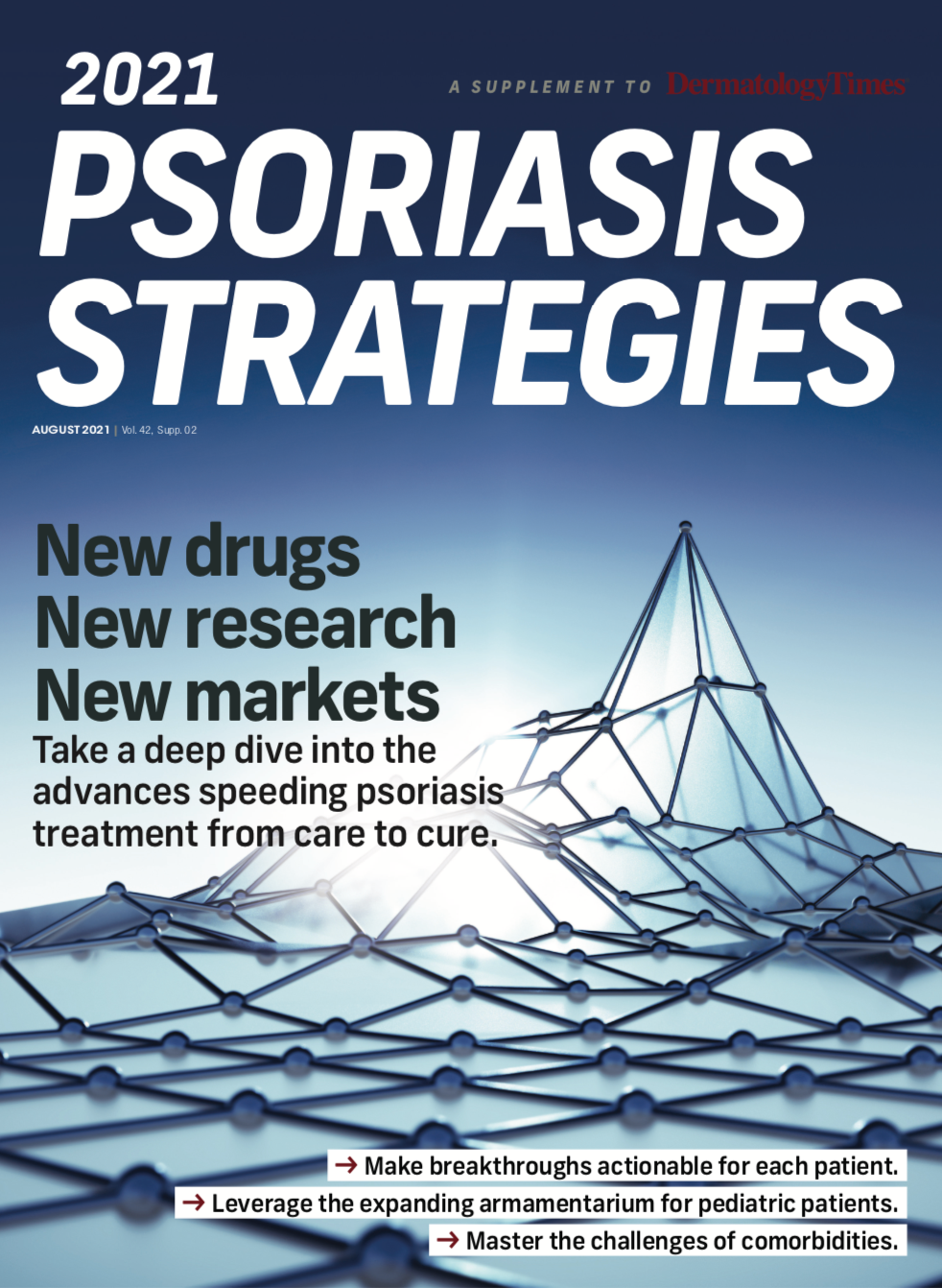- Case-Based Roundtable
- General Dermatology
- Eczema
- Chronic Hand Eczema
- Alopecia
- Aesthetics
- Vitiligo
- COVID-19
- Actinic Keratosis
- Precision Medicine and Biologics
- Rare Disease
- Wound Care
- Rosacea
- Psoriasis
- Psoriatic Arthritis
- Atopic Dermatitis
- Melasma
- NP and PA
- Skin Cancer
- Hidradenitis Suppurativa
- Drug Watch
- Pigmentary Disorders
- Acne
- Pediatric Dermatology
- Practice Management
- Prurigo Nodularis
- Buy-and-Bill
Publication
Article
Dermatology Times
Transform Pandemic Lessons Into Actionable Care Plans
Author(s):
COVID-19’s lingering impact brings new considerations for treatment regimens for pediatric patients with psoriasis.
Children and adolescents aged 12 to 15 years are now eligible to receive COVID-19 vaccinations and additional trials are underway to evaluate vaccines’ efficacy and safety for those under 12. However, coronavirus is not in the rearview mirror for the pediatric population. Dermatologists and investigators are just beginning to assess the pandemic’s full physical and psychological burden on pediatric patients with psoriasis.
New study data, along with guideline updates from organizations such as the National Psoriasis Foundation and regulatory guidance from relevant government agencies, are helping to build a new framework for developing more effective treatment plans for pediatric patients with psoriasis within the context of COVID-19.1,2
The first step for most practices is reestablishing regular consultations with pediatric patients and their families.
Gaps in care negatively affected US children and teens with psoriasis during the pandemic, according to Lawrence Eichenfield, MD, vice chair of the Department of Dermatology, professor of dermatology and pediatrics at the University of San Diego School of Medicine and chief of pediatric and adolescent dermatology at Rady Children’s Hospital-San Diego. Eichenfield said he and colleagues saw patients with significant disease and delayed diagnoses because families were hesitant to visit the medical center during lockdown.
Lawrence Eichenfield, MD

“Many patients missed visits, even virtual visits, as the pandemic started,” Eichenfield told Dermatology Times®. “We reached out to some patients on biologics or responded to queries…about whether they should continue on with their medications and how they might communicate with us about infections or concerns about infections. Reflecting several position statements from relevant organizations, our policy called for continuation of systemic therapies with pediatric psoriasis, along with reasonable, and fairly aggressive, consideration about exposure situations and masking.”
COVID-19–related stresses affected some pediatric patients with psoriasis not only physically, but mentally, according to Eichenfield. He and his colleagues saw the pandemic’s toll on physical conditions such as skin flaring, but they also noted its impact on many patients’ mood, anxiety, and, in some cases, depression. Independently of psoriasis, all patients in his practice get screening for depression. Adolescent patients had markedly increased mental health issues during the pandemic, he added.
“The good news is none of our patients had complicated COVID-19 infection, and none interrupted systemic therapy,” Eichenfield said.
One of the great pandemic-related advances in France was the technical and regulatory deployment of telemedicine within days of the start of the lockdown. “This allowed us to move forward quickly, to answer questions for many children and adults,” Mahé said. “The children love it. They are in their family [environment] and are very relaxed.”
Emmanuel Mahé, MD

Telemedicine is not the only solution but it has been indispensable during the pandemic, he added. “There is currently work being done to standardize the follow-up of these children, not only in the event of another confinement but in general. For example, parents often have to take half a day off work to bring their children to hospital,” he pointed out.
Teledermatology remains useful for follow-ups and as a screening tool for new visits, according to Eichenfield. “We prefer in-person visits for new evaluations for possible psoriasis, given there has often been misdiagnosis or delays in diagnosis,” he said. “And there is much counseling about how we manage the disease, screen for comorbidities, and select our therapies together.”
Widespread adoption of telemedicine and understanding how to incorporate it in evaluating children who have moderate to severe inflammatory skin disease has taken a leap forward in the United States. It will likely remain an option, according to Elaine Siegfried, MD, a professor of pediatrics and dermatology at Saint Louis University Doisy College of Health Sciences and director of pediatric dermatology at Cardinal Glennon Children’s Hospital, in St Louis, Missouri. “I think there are challenges to doing telemedicine, especially for kids who have total body inflammatory skin diseases like psoriasis or eczema, but I am learning to appreciate what can and can’t be assessed by video and patient-submitted [images],” she said.
Elaine Siegfried, MD

Dermatologists have learned a lot about how COVID-19 and lockdown measures affect children with skin diseases, including psoriasis and eczema, according to Siegfried. She strongly believes that taking a biologic is not a contraindication for getting the vaccine. However, she is not as confident about which systemic treatments are safest at this time because some may be more immunosuppressant than others. Siegfried is also concerned that the number of children participating in clinical psoriasis and eczema trials is always less than that in the corresponding adult trials, and that the pediatric trials generally start later. So long-term safety information is comparatively delayed.
Pediatric-specific data are limited regarding the impact of recently approved biologics for pediatric psoriasis, such as secukinumab (Cosentyx; Novartis) and ixekizumab (Taltz; Eli Lilly and Company), on vaccine safety and efficacy as well as on immune maturation. Experience with the interleukin (IL)-12/IL-23 inhibitor ustekinumab (Stelara; Janssen Biotech) is a little greater because it has been approved for other indications at much higher doses than those used for psoriasis.
“I’m not wary about the IL-4 and IL-13 inhibitor dupilumab [Dupixent; Regeneron Pharmaceuticals/Sanofi-Aventis], because blocking T helper type 2 (Th2)-driven immune responses upregulates Th1 responses, supporting better antibody production,” Siegfried said.
Joel M. Gelfand, MD, MSCE, coauthor of a recent article on National Psoriasis Foundation (NPF) COVID-19 Task Force guidance on managing psoriatic disease during the pandemic,1 said the task force updates its guidance as new data emerge.2 “We’ve issued 31 Delphi-approved recommendations. The most recent focus on COVID-19 vaccines,” said Gelfand, vice chair of clinical research and medical director, Dermatology Clinical Studies Unit, director at the Psoriasis and Phototherapy Treatment Center, and a professor of dermatology, epidemiology in biostatistics, and epidemiology at the University of Pennsylvania Perelman School of Medicine in Philadelphia.2
Joel Gelfand, MD, MSCE

NPF guidelines now recommend that patients, including children, should take the first COVID-19 vaccine currently approved under the FDA’s emergency use authorization for which they are eligible. This aligns with similar guidance from the Centers for Disease Control and Prevention4 and the American Academy of Pediatrics.5 “We generally recommend patients stay on systemic therapies when receiving a COVID-19 vaccine,” Gelfand added.
However, out of what Gelfand described as an abundance of caution and until more data emerge, the NPF task force recommends that patients with psoriatic disease who are taking abatacept, cyclosporine, leflunomide, glucocorticoids (eg, prednisone), methotrexate, or tofacitinib continue to take masking and social distancing precautions, even if they have been vaccinated against COVID-19, when they are in contact with people who have not been vaccinated or whose vaccination status is not verifiable. “It is critically important that dermatologists be aware that the task force recommends the use of antibody ‘cocktails’ for patients who develop COVID-19 and are at high risk for progressing to severe COVID-19 and/or hospitalization,” he said.
He also pointed out 2 main differences in approaching treatment for children vs adults with psoriasis. “First, due to their young age they are generally at low risk for a severe course of COVID-19 illness,” he said. “However, children with psoriasis may have comorbidities such as obesity that increase their risk. Second, social distancing may be more challenging for children than for adults. The task force recommends that children with psoriasis mask and distance when at school. If the school environment is unable to ensure these prevention measures or families believe their child may not be able to adhere to these practices, we encourage discussion with the patient, caregivers, and [their] clinician to collectively develop a learning plan [that is] in the best interest and safety of the child.”
The most important message is that children with psoriasis should continue their systemic therapies during the pandemic, he continued. “While some uncertainty remains, it is clear that stopping systemic treatment has led to psoriasis flares in many cases, which can only worsen the emotional burden of coping with the disruptions caused by the pandemic,” Gelfand said.
Pandemic challenges continue, despite the rollout of major programs related to COVID-19 and particularly on the vaccine front, according to Gelfand. “While the risk of hospitalization or death from COVID-19 in children is very low, the risk of long-term effects of having COVID-19 in childhood is only starting to emerge, as [is] the development of new variants which pose new threats, particularly to those who are not vaccinated,” he said.
Disclosures:
Mahé is a consultant, advisor, or speaker for AbbVie, Amgen, Celgene (Bristol Myers Squibb), Eli Lilly and Company, Janssen Cilag, LEO Pharma, Novartis, and Sanofi.
Gelfand served as a consultant for Abcentra, AbbVie, Bristol Myers Squibb, Boehringer Ingelheim, Eli Lilly and Company (DMC), GlaxoSmithKline, Janssen Biologics, Mindera Dx, NeuroDerm (DSMB), Novartis Corp, UCB (DSMB), and Trevi Therapeutics, and received honoraria. He receives research grants (given to the trustees of the University of Pennsylvania) from Boehringer Ingelheim and Pfizer Inc and received payment for continuing medical education work related to psoriasis that was supported indirectly by pharmaceutical sponsors. He is a co-holder of a patent of resiquimod (Galderma) for the treatment of cutaneous T-cell lymphoma. He is a deputy editor for the Journal of Investigative Dermatology, receiving honoraria from the Society for Investigative Dermatology; chief medical editor for Healio Psoriatic Disease, receiving honoraria; and a member of the board of directors for the International Psoriasis Council, receiving no honoraria.
Siegfried receives honoraria or consulting fees from, or she/her institution has research ties to, AbbVie, Eli Lilly and Company, Janssen Pharmaceuticals, LEO Pharma, Novartis, Pfizer Inc– DSMB, Regeneron, Sanofi Genzyme, and UCB–DSMB.
Eichenfield has consulting and/or research ties to AbbVie, Allergan, Almirall, Dermira, Eli Lilly and Company, Galderma, Glenmark, Incyte, LEO Pharma, Novartis, Ortho Dermatologics/Valeant, Otsuka Pharmaceutical Co, Pfizer Inc, and Sanofi-Regeneron.
References:
- Gelfand JM, Armstrong AW, Bell S, et al. National Psoriasis Foundation COVID-19 Task Force guidance for management of psoriatic disease during the pandemic: version 2–advances in psoriatic disease management, COVID-19 vaccines, and COVID-19 treatments. J Am Acad Dermatol. 2021;84(5):1254-1268. doi:10.1016/j.jaad.2020.12.058
- COVID-19 Task Force guidance statements. NPF. Updated June 1, 2021. Accessed June 28, 2021. https://www.psoriasis.org/covid-19-task-force-guidance-statements/
- Beytout Q, Pepiot J, Maruani A, et al; Association France Psoriasis; Research Group on Psoriasis of the French Society of Dermatology (GrPso); Research Group of the French Society of Pediatric Dermatology (SFPD). Impact of the COVID-19 pandemic on children with psoriasis. Ann Dermatol Venereol. 2021;148(2):106-111. doi:10.1016/j.annder.2021.01.005
- Covid-19 vaccines for children and teens. Centers for Disease Control and Prevention. Updated May 27, 2021. Accessed June 30, 2021. https://www.cdc.gov/coronavirus/2019-ncov/vaccines/recommendations/adolescents.html
- Committee on Infectious Diseases. COVID-19 vaccines in children and adolescents. Pediatrics. Published online May 12, 2021. doi:10.1542/peds.2021-052336
- COVID-19 advice for the public: getting vaccinated. World Health Organization. Updated June 14, 2021. Accessed July 1, 2021. https://www.who.int/emergencies/diseases/novel-coronavirus-2019/covid-19-vaccines/advice







